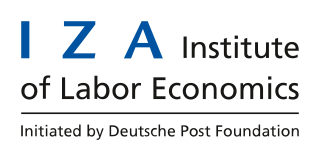 | |
| Producer | ZBW – Leibniz Information Centre for Economics (Germany) |
|---|---|
| Languages | German, English |
| Access | |
| Cost | Free |
| Coverage | |
| Disciplines | Economics |
| Format coverage | working papers, articles |
| No. of records | 127,000 |
| Links | |
| |
EconStor is a disciplinary repository for Economics and Business Studies which offers research literature in Open Access and makes it findable in various portals and search engines. The service is operated by the ZBW – Leibniz Information Centre for Economics. [1]
A disciplinary repository is an online archive containing works or data associated with these works of scholars in a particular subject area. Disciplinary repositories can accept work from scholars from any institution. A disciplinary repository shares the roles of collecting, disseminating, and archiving work with other repositories, but is focused on a particular subject area. These collections can include academic and research papers.

Economics is the social science that studies the production, distribution, and consumption of goods and services.

The German National Library of Economics is the world’s largest research infrastructure for economic literature, online as well as offline. The ZBW is a member of the Leibniz Association and has been a foundation under public law since 2007. Several times the ZBW received the international LIBER award for its innovative work in librarianship. The ZBW allows for access of millions of documents and research on economics, partnering with over 40 research institutions to create a connective Open Access portal and social web of research. Through its EconStor and EconBiz, researchers and students have accessed millions of datasets and thousands of articles. The ZBW also edits two journals: Wirtschaftsdienst and Intereconomics.
Contents
The majority of the publications originates from German institutions in economic research and is provided in accordance with usage agreements. Individual researchers can also submit their scholarly papers to EconStor.
EconStor maintains a list of influential journals publishing literature in economics [2] . According to latest criteria toll access journals and open access journals can only be included in EconStor collections/archives on condition that they are indexed in Scopus or SSCI and DOAJ as well. EconStor also feed its data to other databases and portals like EconBiz, Google & Google Scholar, BASE — Bielefeld Academic Search Engine, WorldCat, and OpenAIRE [3] . Report publishers and journals publishing quality research are archived with EconStor e.g., Journal of Choice Modelling, International Journal of Management, Economics and Social Sciences, and Weekly Report - DIW Berlin.
Publications include mostly working papers, discussion papers and conference proceedings, but also articles in journals and theses.
The most important professional association for economists in Germany, the Verein für Socialpolitik (German Economic Association), has been using EconStor since 2010 to publish conference papers submitted for its Annual Meeting online.
One of the most important online dissemination channels for EconStor documents is the database RePEc, [4] where EconStor is also one of the largest content providers.
EconStor counts among the largest repositories in its discipline and in Germany with more than 127,000 full-texts. [5] [6] [7] [8] [9]










